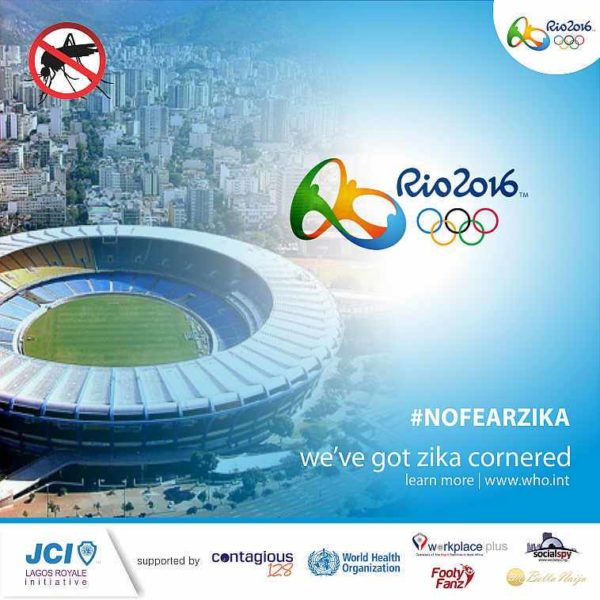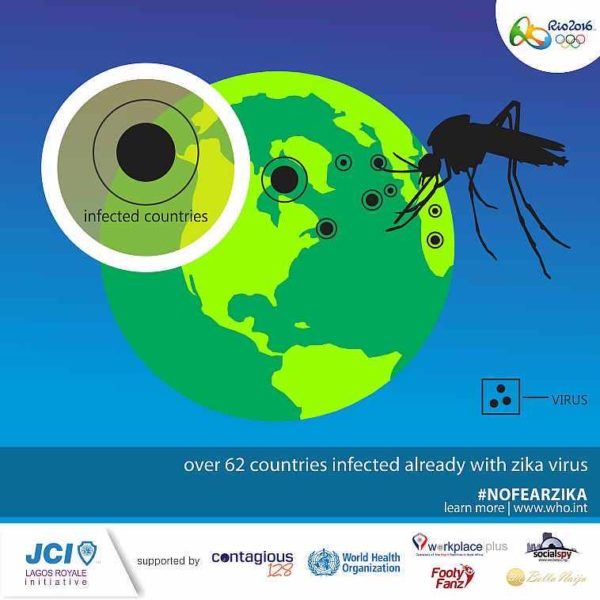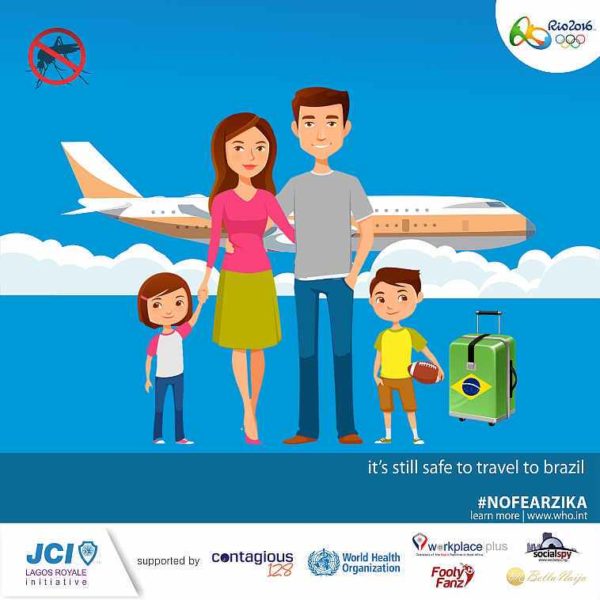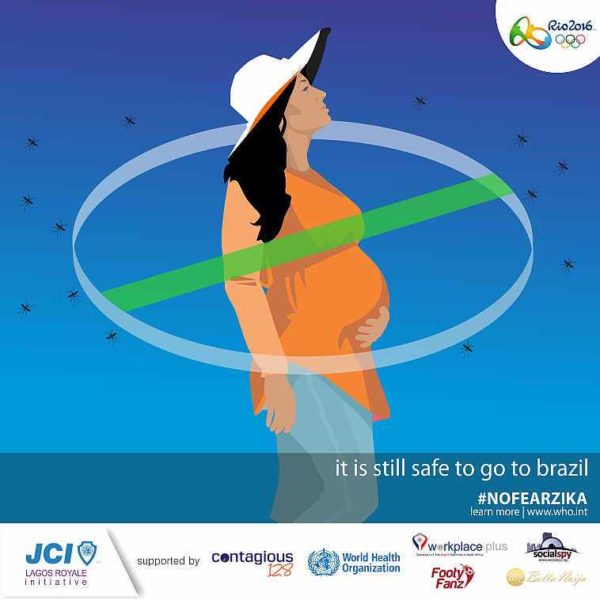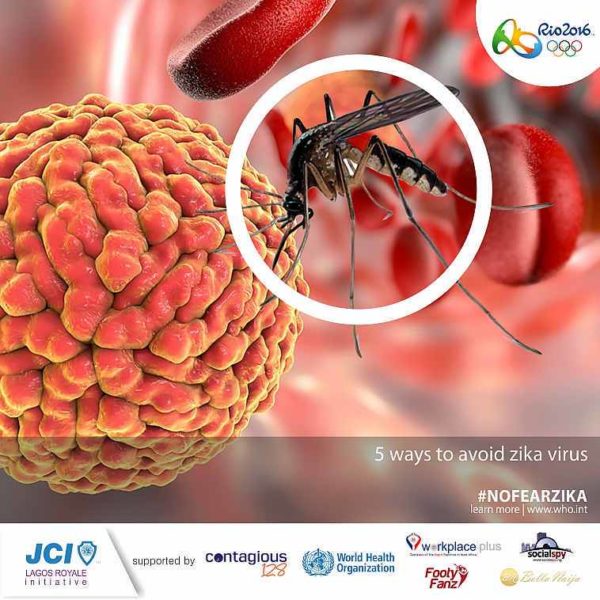News
Travelling for the Rio 2016 Olympics? Here’s what JCI Lagos Royale, Contagious128 Media, W.H.O, BellaNaija and More have to tell you about the Zika Virus #NoFearZika
Since the first case of Zika Virus in Uganda 1947, sectors and different NGO’s has embarked on different methods and means to curb the disease.
To combat the outbreak of Zika virus, JCI Lagos Royale in partnership with Contagious 128 Media, BellaNaija and the World Health Organization (WHO) has set up an online campaign tagged #NoFearZika to create awareness about the disease.
The campaign is focused on mobilising citizens via social media to adopt best practices that will help protect them and their families from contracting the disease.
These practices are necessary to help slow, the spread of the deadly disease and eventually stop the virus. The #NoFearZika digital campaign is particularly geared towards the forthcoming Olympic games in Brazil whose 15% of her population is currently infected with the disease.
Working with the partners on this campaign, the #NoFearZika campaign focuses on education about the virus to reduce misinformation and ignorance about how the virus spreads, how it can be controlled and how to curtail it even after Rio 2016 travellers return to their various countries.
However, the fuss about Zika virus is in no way a matter to give little priority, it has in fact proven to be a global concern. This is owing to the fact that its transmission has become widespread and the vector of the disease, infected Aedes mosquitoes, even more rampant. Studies have shown that Brazil, the host nation for this year’s Olympic games, has been plagued by the spread of this virus; this undoubtedly puts guests at risk of contracting the disease.
In view of this eventuality, it is therefore paramount for travellers to be in-the-know about the disease: how it is transmitted, its symptoms, and the mosquito responsible for it.
Facts
Zika virus is spread through the bite of infected Aedes mosquitoes:
It is impossible to tell the difference between an infected mosquito and one that isn’t, but it is possible to keep yourself from mosquito bites. While in Brazil, it is advisable to put on clothing that cover every part of your body, use insect repelling creams, and mosquito nets.
It can be transmitted through sexual intercourse
The disease is also transmitted through sexual intercourse, hence the need to either use a condom or abstain from any sexual interaction. It is an open secret that events such as this one provides an opportunity for sexual relations to thrive but with this virus in view, such tendencies should be nipped in the bud.
No vaccine or medicine
There is no available vaccine or treatment for the ailment whatsoever to fall back on in case of infection. This re-enforces the need to prevent the virus from spreading across board. What is it that they say about prevention being better than cure? Well, when there is no cure, prevention is not just better, it is the only option.
The Aedes mosquito bites at different times of the day:
The mosquito responsible for the spread of the Zika virus has been said to be an aggressive daytime biter; but that does not negate its nefarious activities at night. Travellers, therefore, should not have the false notion that it operates only at night.
Infected people could infect mosquitoes:
This might sound surprising but it is a true. If a mosquito feeds on an infected person, the virus is transmitted to that mosquito which can in turn infect other people. In light of this, not only humans are at risk of getting infected, and the more infected mosquitoes flying around, the more likely people will get infected.
The virus can be passed from mother to baby:
There is an obvious connection between a mother and her baby still forming in the fetus, and this synergy makes it possible for the Zika virus to be passed. This transmission does not leave the baby unscathed as there are health problems that are accrued to it.
The virus can be passed through blood transfusion:
There have been reported cases of this occurrence in Brazil and some other areas plagued by the disease. Blood transfusion readily makes the transmission of the disease seamless. It is best practice to conduct adequate tests before blood transfusions are done to curtail this spread.
An infected person may or may not experience any symptoms:
Some of the symptoms of the disease includes: rash, fever, muscle pain, fatigue, bloodshot eyes, and nausea. It is also noteworthy that some infected persons may not show these symptoms or may experience them at a later time. Not seeing any physical evidence to account for these symptoms is definitely not a reason to indulge in sexual relations.
The mosquito that spreads Zika virus also spreads dengue and chikungunya viruses:
People should not get caught up in the general apprehension of Zika virus that they relegate the possibility of contracting other diseases. Travellers should try to protect themselves from any mosquito bite.
Zika virus mosquito vector does not live at elevations above 6500 feet:
Travelers who plan to pitch their tent at such high altitudes are safe from this menace as the mosquito responsible for the transmission of the disease does not get to the stipulated height.
Final words
The Zika virus may be rampant but it can be beaten at its game. Guests should pay keen attention to the above information about the disease and take precautionary steps to avoid getting infected. Let the games begin!
Details on how to control Zika Virus is available on Contagious128.com/zika-virus or www.who.int
Lets spread the word not the virus. #NofearZika
______________________________________________________________________
This content has been published for free as part of BellaNaija.com’s commitment to youth, education, healthcare and community development as part of our corporate social responsibility programme.

